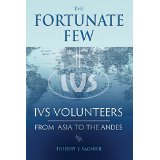The Peace Corps and the Vietnam War, Part One
Recently I have been reading two books that focus on volunteering in the time of the Vietnam War. The one that we are blogging about currently, Dr. Molly Geidel’s Peace Corps Fantasies: How Development Shaped the Global Sixties. The second is The Fortunate Few: IVA Volunteers From Asia to the Andes written by Thierry J. Sagnier.
The IVS was founded in 1953 and played a key role in the establishment of the Peace Corps in 1961. Over 30 PCVs were IVsers after their service, another four became PCVs after IVS and some 17-18 were on the staff of the Peace Corps.
Dr. Geidel spends a lot of time in her book detailing how PCVs spent time in the Peace Corps hiding from the draft, (remember now the good doctor has already said early PCVs in the ’60s were “ruggedly masculine figure” and now she is claiming we didn’t want to fight. More about this later.)
Geidel also writes that the Peace Corps did it best to distance the agency from the military.
Then Geidel tells a story that is new to me and will be new, I imagine, to most (if not all) of you. At the time I was finishing up my second year as a PCV in Ethiopia.
On page 157 of her book, in Chapter 5 Ambiguous Liberation, she writes, “Recognizing the power of the Peace Corps’ vision of brotherhood in his attempt to pacify and modernize Vietnam, Johnson requested in the spring of 1964 that USAID recruit former Peace Corps volunteers for its “Vietnam Rural Affairs Program.”
(This footnote, is referenced in her Notes as: William S. Gaud to McGeorge Bundy, “Ex-Peace Corps Personnel for Vietnam,” May 12, 1964, National Security Files, Peace Corps File, Box 42, Lyndon B. Johnson Library, Austin.)
Geidel writes that the USGA backed away from Johnson’s idea, arguing that RPCVs in Vietnam and Laos, “would be damaging to both agencies’ reputations.”
However, as the fighting escalated, the Peace Corps considered sending volunteers to Vietnam. Geidel states, writing, “In a November 1965 regional directors meeting, most participants seemed enthusiastic: William Josephson [i.e. General Counsel] suggested that sending in volunteers to “work with the Red Cross or refugees” might allay international criticism of the United States and help recruiters answer potential volunteers who “want to talk about Viet Nam.”
Other directors concurred that Peace Corps volunteers could support a health program in South Vietnam. Wiggins even suggested some PCVs “could also work in North Viet Nam in a non-political job such as nursing.”
(This is from the “Associate Directors Meeting,” November 16, 1965, Office Files of the Regional Director, Box 13, Folder 5, Peace Corps Papers, National Archives, College Park, Md.)
Then in early 1966 Wiggins and Regional Director Ross Pritchard visit Vietnam “to discuss where the Peace Corps could be of assistance, perhaps in relation to the refugee problem.”
(This comes from an Associate Directors Meeting held on January 19, 1966, Box 13, Folder 5, National Archives College Park Md.)
End of Part One
I never heard this story either even when in 1967 I took on my Seattle draft board to allow me to leave CONUS to travel to Vietnam to help set up combat base USO service clubs. I actually had to threaten the with newspaper articles about how my local Board wouldn’t let me travel to RVN in support of our troops. They quickly capitulated. I spent 2-1/2 years there. Like Peace Corps service, for a truly transforming experience.
Then sometime in the mid-1990’s Wiggins and I developed a formal plan for the Clinton White House that allow some volunteer Volunteers to “go into harm’s way,” initially to serve in Somalia. In our model they might work with security provided by local American troops. We were never quite sure if it was ever read there. But while not a direct ancestor, our plan presaged the later Crisis Corps.
There is no doubt that Wiggins and Prichard made the trip to Vietnam to assess whether peace corps operation made sense in Vietnam. Pritchard told me that they concluded it was a unwise idea. He also told me that they made the mission only because of pressure from President Johnson. For my research on the history, I could not find a copy of theReport by Wiggins and Prichard. Prichard said he had no copy himself.
Uck! Just examine “pacification’ the word used. Stunk.
Dissimulation, lies,evasion, and ‘pacification’ didn’t fool many then.
Peace Corps Volunteers in South Vietnam would have been merely cannon fodder for the Communist forces. We in the military were not able to provide any sort of meaningful security to the peace corps.